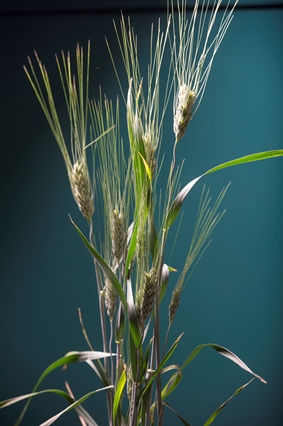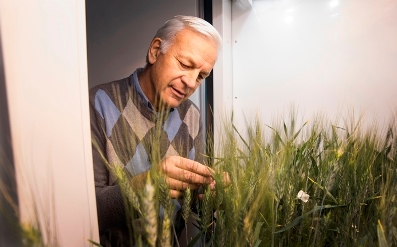Wheat Gene Database is Tool for Improved Yield and Nutrition
Plant scientists and wheat breeders now have a new tool to develop more nutritious and productive wheat varieties: A public online database of 10 million mutations in wheat genes. Scientists at UC Davis and three institutions in the UK created the database, which will allow scientists worldwide to study the function of every gene of wheat. The research was reported in Proceedings of the National Academy of Sciences this week.
"Understanding the function of different genes is critical for wheat improvement," said Jorge Dubcovsky, a plant geneticist and project leader in the Department of Plant Sciences at UC Davis. "By creating mutant populations of wheat, we can knock out or alter the function of specific genes in wheat plants and see how it impacts important factors such as growth, yield, photosynthesis, dietary fiber, and nutrition. We are already using the information to develop new wheat varieties."
Mutation is a natural process in all organisms. When cells copy their DNA, they make errors and generate mutations -- a slow process in nature. Using chemicals, the researchers greatly accelerated the mutation process to generate roughly 10 million mutations covering most of the genes of 2,735 wheat plants. Using gene capture and high-throughput sequencing technologies they sequenced 400 billion base pairs of DNA to identify most of these mutations, and organized them in a public database.
Wheat researchers anywhere can search the database to find lines with mutations in the genes they want to study and then order seeds from repositories in UC Davis and the John Innes Centre in the UK. More than 3,000 seeds with individual mutants have already been distributed.
"This project will help researchers who are trying to identify or characterize genes that control morphological or physiological traits, or that affect speed of growth, or adaptation of wheat nutritional value," said Dubcovsky. "This is a powerful tool."
Improving Wheat
"We have already developed wheat germplasm with combined mutations that result in larger seeds or higher levels of dietary fiber," said Dubcovsky. "With our partner groups, we're close to releasing varieties including these improved traits."
UC Davis Plant Sciences Professor Jorge Dubcovsky is working to improve the yield and nutritional value of wheat, one of the world's most important crops.
With climate change, there will be a need to adapt wheat to different conditions -- such as the need to flower earlier or later, or produce quickly in areas with very short growing seasons. Dubcovsky's laboratory has been studying the genes that control wheat flowering time for a long time, and this new tool has allowed him to understand the complex network of genes responsible for wheat adaptation to different and changing environments. The next major project for this research group is to study the gene pathways that control wheat yield.
"With a global production of 700 million tons of wheat every year, and with a fast-growing human population," said Dubcovsky, "there is a strong need for wheat research. Twenty percent of caloric and protein intake of the human population is from wheat, so this research is important."
Collaborating Institutions:
Researchers at UC Davis include Professor Jorge Dubcovsky, postdoc Ksenia Krasileva (now at the Sainsbury Laboratory, Earlham Institute, and first author of the PNAS study) and Ph.D. students Tyson Howell and Hans Vasquez-Gross.
The three participating UK institutions are the John Innes Centre, Earlham Institute, and Rothamsted Research.
Major funding for this project came from the Howard Hughes Medical Institute (HHMI) and the U.S. Department of Agriculture (USDA).
Media Contacts:
- Jorge Dubcovsky, UC Davis Department of Plant Sciences, 530-752-5159, jdubcovsky@ucdavis.edu


